Iran and EU: two different and complicated worlds meet
Four experts in international politics from Austria have been invited to discuss European, global and Middle East issues with colleagues from Iran in an Institute closely connected with the Iranian Foreign Ministry on Teheran. Heinz Gärtner, Gudrun Harrer, Arnold KammeI and myself representing the IIP were the Austrian discussants. The subject I was asked to speak about, was the relationship between Iran und the European Union with specific reference to the Middle East. To begin with I asked who is the EU today, especially after the decision on Brexit, but the same question can rightly be put concerning the Islamic Republic of Iran.
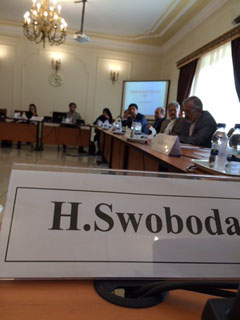
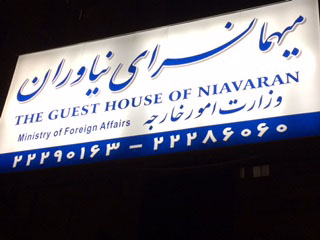
Iran today with uncertainties for tomorrow
Let’s start with the Iran. Who is it really Iran today and who will it be tomorrow or how many Irans are existing and will survive into the future? Is it the Iran of the reformers of former President Khatami who is not allowed to be political active? Is it the moderate line of actual President Rohani. Or rather the line of the Supreme Leader Chatamei, mostly posted with the picture of the historic Revolutionary Leader Chomenei in the background? And what is about so different but still active figures, like former Presidents Rasfashani or Achmedinichad? But let’s leave politics. Are the well and black covered women (but you don’t find burquas in Teheran) and their husbands typical for Iranian society or the women who barely cover their heads and rather show their ample use of western cosmetics? And what does it mean that the majority of students are female?
What is clear: the Iran is a big country with 80 million inhabitants, a median age of 27 years and highly urbanized (71,5%). And the literacy rate of the population between 15 and 24 years is 98%. It has the 18th largest economy of the world, just behind Canada, Spain and Turkey. So one should not neglect this country in a very interesting geoeconomic and geopolitical location.
On the other hand one can see a lot of disorientation and concentration on a consumer and pleasure life. Many of the young spent their evenings at parties with girls not covering their head, when a lot of alcohol is consumed. And if police is coming they are paid with cash to leave again. Well all of these elements and characteristics you find in Iran, especially in Teheran. Of course much of that is happening underground, in secret, much of the political and much of the private life cannot be seen and is officially not existing. That gives Iran not only several faces but establishes also many fights between different groups of hardliners, reformers and people who try to be always on the side of the winners. No clear strategy forward can be established without clear decisions and orientations.
And Europe after Brexit?
The lack of a clear strategy forward can also be found in Europe, especially after Brexit. We do not know, if the new relationship will be more one of competition or cooperation between the EU and the outgoing United Kingdom. Perhaps we should rather ask, in what areas we will find a close cooperation and in what area we will rather compete with each
other, for example in foreign relations and here especially in the Middle East. The EU does also not know, if Brexit should be used to strengthen the common currency, the Euro, now that one important non-Euro country will leave and therefore resistance by a prominent EU member against a strong Euro core inside the EU is weakening.
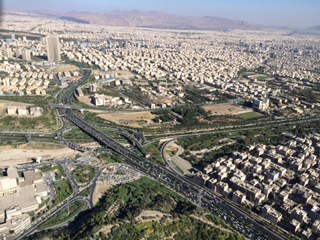
And in view of the strong public resistance inside some member countries against international trade agreements one has to ask, if Europe is still able to act united concerning global political and economic issues. In addition Europe has not yet found a comprehensive and convincing refugees and – general – immigration policy. Many of these tendencies lead to a more inward looking and nationalistic attitude which also results in respective election results for populist groups and parties.
Looking inward is no viable strategy
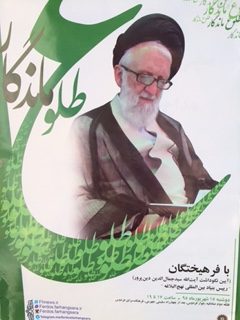
So two partners who are rather inward looking in order to settle and redefine themselves have to deal with each other. The EU has to digest the forthcoming Brexit which still has to be defined and implemented and Iran has to reorient itself after the Vienna nuclear agreement (JCPOA) by and the principal lifting of sanctions, but with the USA still making a lot of – financial – problems. Nevertheless both sides should, in spite of their domestic problems, look for a strategy forward. They must know: the world is not waiting for them to solve all their internal problems.
Mutual trust must and can be built
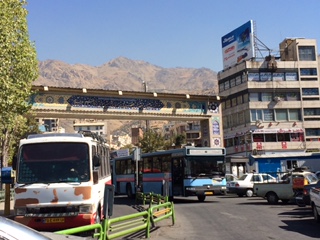
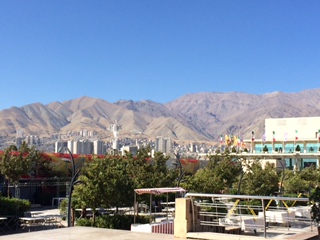
The Iran should overcome its historical wounds especially in its relation to the US and the UK. Of course the dreadful intervention against the elected Prime Minister Mossadegh by these powers in order to defend their oil and gas interests was an awful example of colonialism and new-colonialim. And also the reaction after the Islamic Revolution especially by the USA was not very clever.
And the West as everybody must be interested to have rather less than more nuclear weapons. But the sanction regime did not really help the US and Israel, two nuclear powers, and furthermore it promoted corruption inside Iran. Because any sanctions can be overcome, but it always creates a class of winners who have to be corrupted by those who want to import the forbidden goods.
But continuous utterings against the existence of Israel and its basic rights, especially by President Achmedinichad, were also not creating confidence in the West including Europe. The death penalty as such and especially the number of convictions to death are very deplorable from a human rights position and are rightly much critter in the West. On the other side Europe has not really engaged itself constructively in our neighboring region with many conflicts, conflicts which have very often their roots in former colonial occupations and divisions.
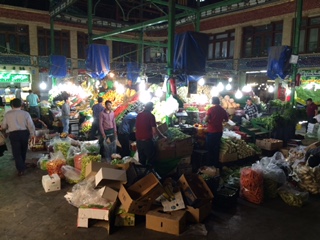
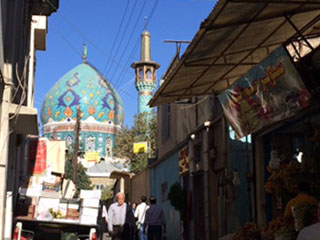
But we need an engagement which looks into the future and which has not military interventions in its centre. Because these very often are creating rather than preventing terrorism as we can see every day. And we should welcome the interest of Iran to form an international coalition against terrorism seriously, although we remember times, when some authorities of Iran were at least very sympathetic towards terrorism or even promoted it.
Overcoming the hot conflict between Iran and Saudi-Arabia
Nevertheless we have to find new ways of cooperation especially in view of the terrible war in Syria and the different insecurities stemming from that war. We should convince both sides, the Iranian and the Saudi side and their respective allies to stop to engage themselves in proxy wars and to try to establish some status quo of stability, both sides can live with. The deep differences between Saudi Arabia and Iran and between Shiites and Sunnis will continue to exist. Unfortunately, from both sides we hear again and again words and declarations which are deepening the splits instead of softening the differences.
These disputes have their religious roots but today they are very much connected with power competition. The rest of the world, especially Europe cannot be happy about it, as these differences are supporting terrorism and not preventing it. Without arrogance we should present the – recent – European experience, that long lasting differences can be overcome and common interests can prevail. Even if in Europe nationalistic forces of today with approaches of yesterday are preaching the contrary in order to gain votes, Europe could still demonstrate that cooperation and negotiating is more successful than the contrary.
Economic connectivity
Economic interests and cooperation are one element of such a New World we should create. Economic links and especially globalization is no guarantee against new conflicts, but they create forces which are afraid of losing because of conflicts and wars. This is primarily true for those many non-military industries which are interesting in having stable and growing markets and trade facilities with as little barriers as possible.
Iran is a very interesting economy for Europe. It has huge reserves of gas and oil but also many other mineral resources. It has also several industrial productions for example in the automotive industry. It has also a well qualified work force and internet use is very wide spread. Nevertheless there are barriers and limitations. One is bureaucracy the other is the mistrust towards its own citizens by the authorities, which still block – at least officially – some internet sites and the use of Facebook and Twitter. Well, the Iranian chairman of our discussion countered, that Iran is trusting its citizens but not the misuse by the „West“ of these instruments of communication.
But this is again a typical parallel world. Beyond and besides the official limitations and censorship exists a well known world of experts to overcome it. But it makes life much more complicated. It is as with the tabu of alcohol. Parties with alcohol do take place, the police or the Revolutionary guards do know it and they are paid by party guests not to „notice“ it. And of course foreign companies find ways to overcome some of these obstacles but it promotes corruption and that is not good for any economy.
A new multilateral approach
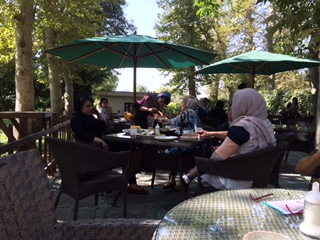
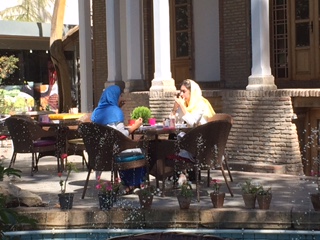
Iran is not only interesting for Europe and its member countries for bilateral economic relations. Iran is at the crossroad along a East – West axis coming from China and going towards Europe. India and Turkey in between are two very interesting countries which could participate together with others in these economic investment and trade connections in the southern branch of the Silk Road. On the other hand Iran is at the Centre of a North South Axis between Russia and the Arab World and East Africa. Armenia, Aserbeidschan and also some Central Asian countries can be connected into that axis. Now economic connectivity does not depend on geographical connectivity, but it helps to easy and create contacts for example for multiple transport connections. Also in digital times, geographical neighborhood brings advantages.
Give the new generation a chance
In Europe as in Iran a new generation is looking for new chances in a globalized world. The resistance in Europa against the fore – mentioned trade agreements like TTIP is one side of the coin. On the other side there are many interested in creating start ups by using the modern forms of communication and technologies. And in Iran there are many well trained young people who would be ready to engage themselves in modernizing their country. Some of them want to leave the country rather sooner than later as they see so many obstacles and double talking and no chance to succeed and earn a decent income. The present political climate seems to push them into consumerism which is in contradiction to the official religious dogmas. But it seems to be tolerated as long as it does not disturb and endanger the political structures.
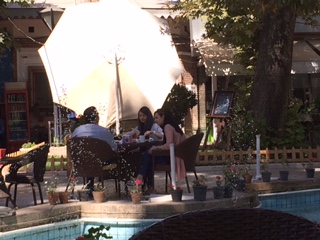
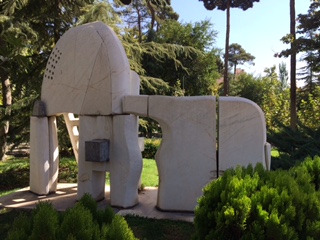
This way a lot of intellectual capacity is lost by the lack of necessary reforms and openness. I do understand the fear of losing the Iranian identity. The neutral, objective way the treasures of the disposed Shah of Persia and of Farah Diba are shown today is part of a regained pride and attitude towards Iranian history. But Iran needs partners and friends to meet the many needs of their huge population, especially its young generation.
